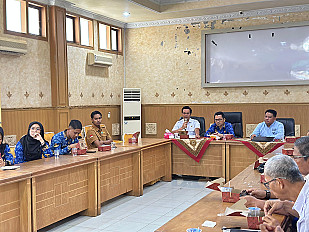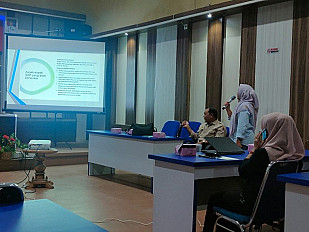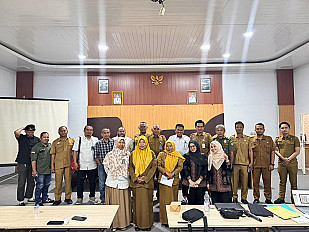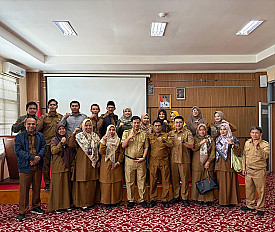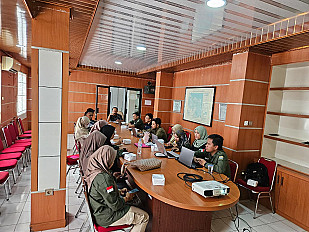News
444
Accelerating the BioCF-ISFL 2025 Program: Challenges, Strategies, and Recommendations

Portal BIOCF
Tuesday, 23 September 2025 Post 12:09 AM
Jambi, October 2025 — The Jambi Provincial Government, through the Regional Development Planning Agency (Bappeda), together with various Regional Apparatus Organizations (OPDs) and supporting institutions, continues to accelerate the implementation of the BioCarbon Fund Initiative for Sustainable Forest Landscapes (BioCF-ISFL) program, which will reach a critical stage in 2025 and 2026. In a cross-sector coordination meeting involving various technical agencies and partners, the Head of the Jambi Provincial Bappeda, Ir. Agus Sunaryo, M.Si., emphasized the need for accelerated and synchronized steps between OPDs. "The 2025 implementation projection only runs until October. Several activities have not yet been implemented because they are still awaiting changes to the Regional Budget (APBD)," he said. He added that for 2026, implementation will only last until May, with the reimbursement process already underway in June. Furthermore, there is a significant discrepancy in the budget ceiling. The RKA document lists only IDR 4 billion, while coordination with the Ministry of Environment and Forestry and the World Bank indicates a potential ceiling of up to IDR 6 billion. "This requires follow-up in the form of a LEMTARA agreement and performance allocation," Agus emphasized.
Input from Technical OPDs: Field Challenges
A representative from the Environmental Agency (DLH), Adi, reported that monitoring and evaluation (monev) activities for safeguards presented a particular challenge. "Many activities were conducted in the field, while the use of budgets for vehicle rentals was a finding during the audit," he said. Furthermore, the DLH is also responsible for implementing customary territory recognition and public consultations involving various stakeholders. From the Forestry Agency's perspective, budget efficiency issues have led to shifts in official travel. Forest Management Units (KPH) also voiced concerns. "KPHs are afraid that once the program is underway, they won't be able to reimburse," said the agency representative. The Plantation Agency noted that the projected 2025 budget is approximately IDR 985 million, allocated for five priority activities. While the figure is not large, clarity and timeliness of implementation remain key concerns.
Regulatory Barriers and Administrative Solutions
According to Agus Sunardi of the Regional Revenue and Finance Management Agency (BPKPD), political dynamics at the Budget Agency (Banggar) level are one of the main obstacles. Nevertheless, he is optimistic that the APBD can be finalized on September 24, with ratification scheduled for September 26. "After ratification, the documents will be sent to the Ministry of Home Affairs three days later. We estimate that the revised budget can be executed between October 27-31," Agus explained. He also emphasized that the reimbursement process has a one-month deadline and that the verification process is expected to be completed by December. Regarding the issue of official vehicle use, the BPKPD reminded that based on the latest presidential regulation, only regional heads and heads of agencies are permitted to use rented vehicles for official activities. To avoid audit findings, efficient operational vehicle management among regional government agencies (OPDs) is recommended. Regarding the budget increase from IDR 4 billion to IDR 6 billion, Agus stated that the additional IDR 2 billion can be immediately distributed to technical SKPDs. "We will also strive to ensure that the DLH's findings are categorized as administrative findings, not serious violations," he added.
Recommendations and Strategic Steps
The coordination meeting also produced several important recommendations:
Given the various technical, administrative, and political challenges faced, cross-sector collaboration and accelerated decision-making are key to the successful implementation of the BioCF-ISFL program in Jambi Province. Commitment from all parties to aligning policies, budgets, and field implementation is essential to achieve maximum results in 2025 and 2026.
Input from Technical OPDs: Field Challenges
A representative from the Environmental Agency (DLH), Adi, reported that monitoring and evaluation (monev) activities for safeguards presented a particular challenge. "Many activities were conducted in the field, while the use of budgets for vehicle rentals was a finding during the audit," he said. Furthermore, the DLH is also responsible for implementing customary territory recognition and public consultations involving various stakeholders. From the Forestry Agency's perspective, budget efficiency issues have led to shifts in official travel. Forest Management Units (KPH) also voiced concerns. "KPHs are afraid that once the program is underway, they won't be able to reimburse," said the agency representative. The Plantation Agency noted that the projected 2025 budget is approximately IDR 985 million, allocated for five priority activities. While the figure is not large, clarity and timeliness of implementation remain key concerns.
Regulatory Barriers and Administrative Solutions
According to Agus Sunardi of the Regional Revenue and Finance Management Agency (BPKPD), political dynamics at the Budget Agency (Banggar) level are one of the main obstacles. Nevertheless, he is optimistic that the APBD can be finalized on September 24, with ratification scheduled for September 26. "After ratification, the documents will be sent to the Ministry of Home Affairs three days later. We estimate that the revised budget can be executed between October 27-31," Agus explained. He also emphasized that the reimbursement process has a one-month deadline and that the verification process is expected to be completed by December. Regarding the issue of official vehicle use, the BPKPD reminded that based on the latest presidential regulation, only regional heads and heads of agencies are permitted to use rented vehicles for official activities. To avoid audit findings, efficient operational vehicle management among regional government agencies (OPDs) is recommended. Regarding the budget increase from IDR 4 billion to IDR 6 billion, Agus stated that the additional IDR 2 billion can be immediately distributed to technical SKPDs. "We will also strive to ensure that the DLH's findings are categorized as administrative findings, not serious violations," he added.
Recommendations and Strategic Steps
The coordination meeting also produced several important recommendations:
- The program application process from villages must go through the stages of allocation, activity proposal, verification, and approval by the province and the ministry.
- Criteria for Non-Governmental Organizations (NGOs) include domicile in the region, a minimum of 7 years of organizational age, and a minimum of 5 years of experience in the relevant field.
- The Provincial BSM Team has been formed and is currently updating the training module.
- SOPs related to benefits identification, risk mitigation, and LEMTARA selection have been developed.
- A draft Gubernatorial Regulation has been prepared and is being finalized.
- The technical team is also developing implementation guidelines (juklak) and technical guidelines (juknis).
- Validation of NGOs and universities is carried out to ensure credibility and avoid conflicts of interest.
- The preparation of the BSP documents, SOPs, operational guidelines, and technical guidelines needs to be expedited so they are ready before funds are transferred or the Emission Reduction Payment Agreement (ERPA) is signed.
- Recognition of customary territories through a Regent's Decree is a priority so that indigenous peoples' demands can be legally accommodated.
- Adjustment of official travel schedules between the central and regional governments needs to be considered for greater effectiveness and efficiency.
Given the various technical, administrative, and political challenges faced, cross-sector collaboration and accelerated decision-making are key to the successful implementation of the BioCF-ISFL program in Jambi Province. Commitment from all parties to aligning policies, budgets, and field implementation is essential to achieve maximum results in 2025 and 2026.
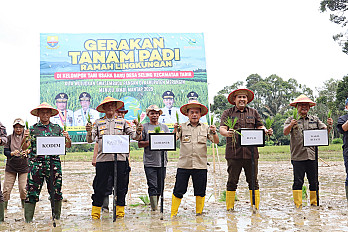
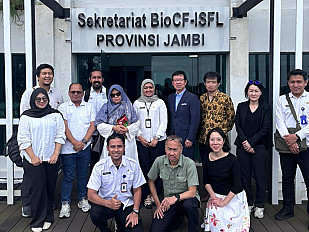
-thumb.jpg)
